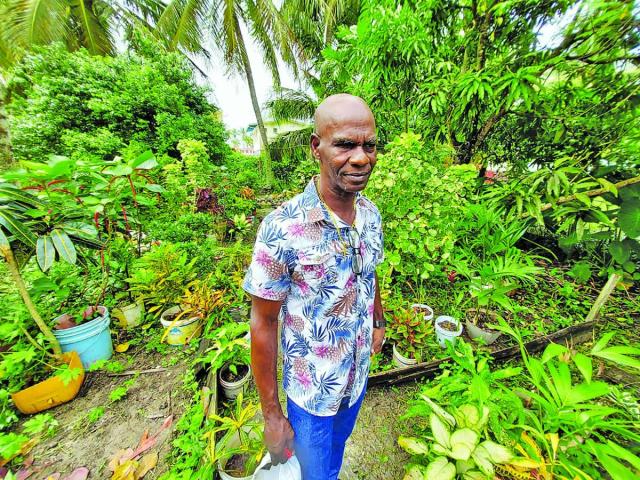By Andrew Carmichael
The holiday season is a time to bring out your festive décor, whether new or treasured heirlooms. Along with the seasonal décor, many of us incorporate the traditional Guyanese flower plants during the season. For some, the plants die a slow death as the new year proceeds.

there are ways to care for these plants and have them all year, and even for the next season. Ernest Parris, called “Jetro”, an officer of the Lusignan Prison, has been cultivating beatification plants for the past six years, and has scores of different species at his home.
Despite the demands of his job, the 59-year-old still finds time for his plants, and now does it as a business. “I do this yearly. Every year-end I would normally go out and sell flower plants and so on,” he said.
He explained that he would acquire his new plants by purchasing same while travelling at various parts of Guyana. “I purchase them small, in small cups, ice cream cups, and little bottles like small beverage bottles and so. I buy them when they are very tiny, and bring them home and transplant them into small buckets, and when they have reached a certain stage, I re-transplant them into larger buckets. I would normally feed them with plant food.”

The plants Parris currently has on sale this Christmas have been acquired at least one year ago, and were nurtured to their current stage. Apart from the financial rewards, Parris says, he enjoys taking care of the plants, but it is hard work. He has already started preparing for next year’s Christmas.
“Every year-end I buy plants to start for the next year. I don’t normally set plants, because you do not get rooting powder to buy anymore, so I do not normally set plans, because you might set 20 plans and you get two. So, I would purchase plants from anywhere – from Georgetown, Corentyne including Port Mourant and Number 79 Village, I would go and buy them,” he explained.
It is a very challenging project, this prison officer has said. He explained that many times some of the plants die a natural death even before becoming large enough for beautification purposes.
 “Even though you buy them a small plant, you might have four dying out of 10. Sometimes you buy 20 and you get 10 dead and 10 living, so I have to do what I have to do for them to survive,” he explained.
“Even though you buy them a small plant, you might have four dying out of 10. Sometimes you buy 20 and you get 10 dead and 10 living, so I have to do what I have to do for them to survive,” he explained.
Sometimes the soil in the plant pot would have to be changed as frequently as weekly. This is to ensure that harmful insects do not take up residence in the pots, he explained.
Apart from those plants, Parris has a lot of fruit trees in his yard, and he also has a kitchen garden; but even though he has been dealing with these plants for so long, there is one thing he is still to learn about plants: Parris could not specifically say what were the different types of plants he has. He referred to them all as either being croton or palm plans.
“To be honest, I have never had the time to trace to see the exact name of each plant. I buy flower plants, all types; I do not know what is what. I call all of them croton or palm, I do not know what is a fern or so,” he explained.
Crotons (Codiaeum variegatum) are colourful plants of the spurge family, and are native to Malaysia and the Pacific, where they are extensively cultivated. Numerous horticultural varieties of shrubs or small trees have been developed, and the plant is commonly grown outdoors in pots or as a houseplant.
Parris can be contacted at his home at Health Centre Street Cumberland, East Canje Berbice, or on cellphone number (592) 697-2236. (G4)
Discover more from Guyana Times
Subscribe to get the latest posts sent to your email.











